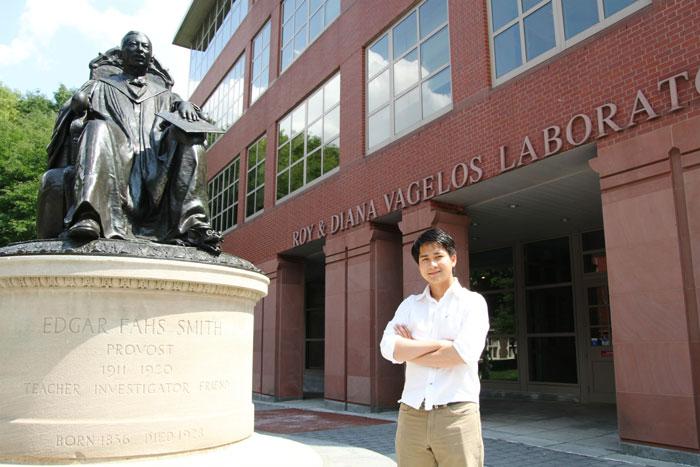Roadblocks and Opportunities

Minh Nguyen '11 is now at the University of Pennsylvania, where his doctoral focus is on the field of total synthesis.
For Minh Nguyen '11, Dickinson set the course for a life in the sciences
As a double major in chemistry and biochemistry & molecular biology, Minh Nguyen '11 was deep into the sciences while at Dickinson. But ask him about his overall experience, and he's just as likely to mention how much he loved his alma mater's interdisciplinary approach. Read about his environmental work at Dickinson, his cancer work at the University of Pennsylvania and the prestigious award he was recently granted.
How did you get interested in your postgraduate work, and what about it excites you most?
After Dickinson, I started my Ph.D. study at the University of Pennsylvania, in which I designed, synthesized and developed a series of polymer-supported silicon reagents that could be employed in many chemical processes to make useful materials or pharmaceutical products. These polymers are easily recycled and reused and thus could help chemists do their work in a more sustainable way—an interest that was instilled in me during my time at Dickinson. I’m also very excited to see that my research is highly regarded by the chemical industry, and I was awarded the Ron Bleggi Graduate Student Award from the International Precious Metals Institute last year for this work.
What does your current work entail?
The second part of my doctoral study is in the field of total synthesis, in which I employ the knowledge of organic chemistry to design and develop an efficient, multistep synthesis route to construct a structurally complex molecule from commercially available building blocks. My current target is Mandelalide A, a recently reported, scarce marine metabolite that shows potent cytotoxicity to a series of human cancer cell lines. However, there is a very limited supply of Mandelalide A in nature, which hinders further study. Thus, I am trying to make it in the lab in a significant amount so that we can investigate the use of this compound in cancer therapy.
What is the most challenging part of your work?
The most challenging part and also the most interesting part is the unexpected problems arising at the late stage of the synthesis. Each time the project reaches a roadblock is an opportunity for problem-solving skills and critical thinking to be employed, and in some cases a new reaction was discovered to solve the problem.
Can you speak to how Dickinson’s useful liberal-arts education might apply to your work?
Since high school, chemistry has been my favorite subject, and I have always wanted to be a scientist. Dickinson not only helped nurture my interest, but it also provided me with a firm foundation that allows me to smoothly transition to the next stage in my career. For example, as a double major in chemistry and biochemistry & molecular biology, I had the opportunity to conduct several research projects with three remarkable faculty members in the chemistry department. These invaluable experiences, without any doubts, taught me the skills and techniques needed to carry out scientific research and provided me with a solid foundation and an inspiration to pursue graduate study in chemistry.
Another great thing about my Dickinson education is that I got to take courses in other areas besides sciences and learned new ideas ... that have guided me ever since.
What was your favorite activity at Dickinson?
I was a big fan of Rush Hour, a lunchtime interdisciplinary science lecture series held throughout each semester. The speakers are drawn not only from the science faculty at Dickinson but also from many research and teaching institutions across the country. I had great joy learning a variety of interdisciplinary sciences.
What jumps out as a great memory from your time at Dickinson?
It’s probably the time when I packed my bag and went for a road trip with [Associate Professor of Chemistry] Amy Witter during the summer of 2010. We traveled along the Susquehanna River and collected sediments for our research, in which we studied and identified major sources of environmental pollutants to urbanizing freshwater stream sediments. It was very memorable to me, as I got to do science and have great fun at the same time. Gladly, our work was published in a high-impact, peer-reviewed journal, Environmental Pollution, last year.
How do you stay involved with and/or support Dickinson?
I stay in touch with both the faculty and the college, as they have become an important part of my life. Whenever I see potential new students, I always encourage them to check out Dickinson and share with them the great impact the college has made on my life.
What are your plans for the future?
I would like to apply my knowledge and skills in finding new ways to prevent and treat disease. It is the main reason I decided to study organic chemistry.
If you could have dinner with someone, living or dead, who would it be?
My dad suddenly passed away when I was in my senior year at Dickinson. There are so many things I would love to share with him.
You’re going to live on an island by yourself for a year: What do you take with you?
I will bring my wedding album with me.
If you could change one thing about your life, what would it be?
I would love to learn to be very good at playing an instrument.
Learn more
- Learn more about Nguyen's research with Witter in "Toxic Driveways"
- Department of Chemistry
- Department of Biochemistry & Molecular Biology
- Alumni in Action
- Latest News
Published February 18, 2015